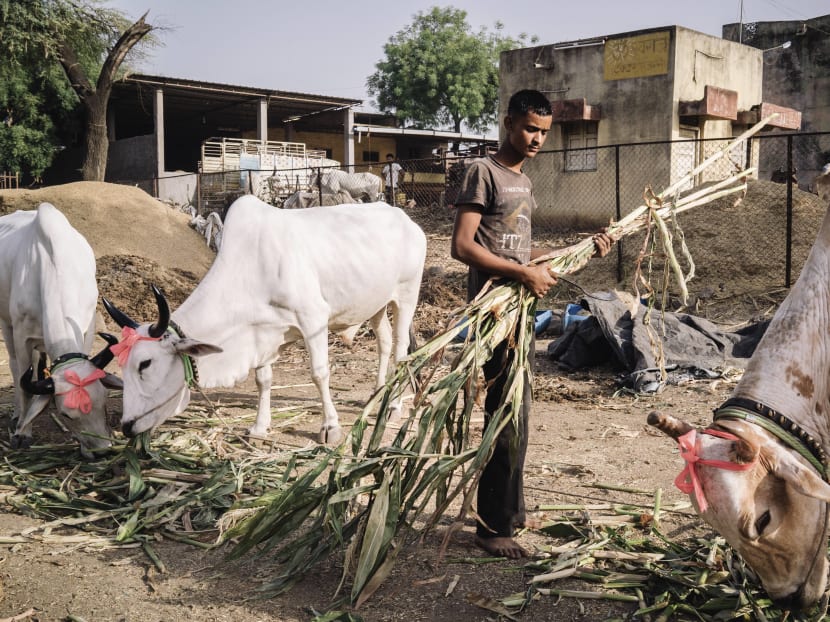India, stung by backlash, plans to roll back restrictions on cattle slaughter
NEW DELHI — India’s Supreme Court on Thursday (June 15) called on the government to answer charges that stringent new restrictions on cattle slaughter violate constitutional rights to freedom of religion and would impose a “huge economic burden” on some of the country’s poorest families.

A man leaves sugar cane leaves for cows at a cattle market in Savda, India, May 3, 2015. New regulations on cattle slaughter, issued last month by the central government, would require any person selling livestock to produce a written guarantee that it will not be slaughtered. New York Times File Photo
NEW DELHI — India’s Supreme Court on Thursday (June 15) called on the government to answer charges that stringent new restrictions on cattle slaughter violate constitutional rights to freedom of religion and would impose a “huge economic burden” on some of the country’s poorest families.
Taken aback by the wave of protest that greeted the regulations, the government said that rather than defend the new rules, it would pre-empt the legal challenge by rolling them back “on an urgent basis,” a top official said.
“Whether we change the language or change the rule, we are doing this on an urgent basis,” said the official, Dr Harsh Vardhan, union minister of the environment. “We want to set this issue to rest. It should take a few days, a few weeks, not long.”
The rules, announced late last month as part of an act to punish animal cruelty, require anyone selling livestock, which includes buffalo and camels, to produce a written guarantee that animals would not be slaughtered.
They were celebrated by far-right Hindu groups as the latest in a series of legal measures intended to protect cows, which many Hindus consider sacred. A high court in the southern state of Tamil Nadu quickly imposed a four-week stay on the measure, saying it violated Indians’ constitutional right to freedom of religion and encroached on states’ rights.
Even with the stay in place, the rules had a chilling effect on livestock markets, already jittery over the proliferation of Hindu cow-protection vigilantes. Representatives of the leather and buffalo meat industries – which together account for around US$10 billion (S$13.8 billion) in yearly exports – warned that the restrictions would lead to a catastrophic drop in supplies, as well as job losses and company closings.
There was also a political cost. The ruling Bharatiya Janata Party (BJP), already popular in the so-called “cow belt,” has been eager to expand its support in the south and north-east, areas where meat is commonly eaten. BJP leaders in two districts in north-eastern Meghalaya state announced their resignation from the party, saying that eating meat was intrinsic to their culture.
Dr Vardhan said the regulations had been widely misunderstood, and there had been no intention to discourage the eating or export of meat.
“We do not want to either influence or change the food habits of anybody, neither do we want to affect the slaughtering business in this country,” he said. “We will continue to work with them. We will facilitate their growth, instead of hampering it.”
He said feedback had been solicited from representatives of the beef and leather industries early this year.
“The government took the decision in the wisest possible way,” he said. “We never anticipated that people would have some misunderstanding.”
But industry executives said they had been caught entirely by surprise when the new rules were made public May 23.
“We were not invited – neither we, nor anyone from the leather industry, nor those who take part in the cattle market – for any discussions before the notification was issued,” said Mr Yusuf Qureshi, who heads an organisation in Uttar Pradesh of traditional butchering families, many of whom own large plants that package and export flash-frozen buffalo.
“Nobody was informed or invited to sit across the table for any suggestions,” he said.
Mr Qureshi said comments by Dr Vardhan, the environment minister, encouraged him. “We want to be invited on board for a road map which lets us function with peace and respectability,” he said.
It was unclear, however, when or how the rules would be amended. Some officials of the governing party continue to rule out any softening.
“There is no question of withdrawing the notification,” said Mr Ramesh Chandappa Jigajinagi, the minister of state for drinking water and sanitation. “We Hindus have been worshipping cows for so long and we should do something for them. Those who are objecting within the party are doing it at their individual level.” THE NEW YORK TIMES





